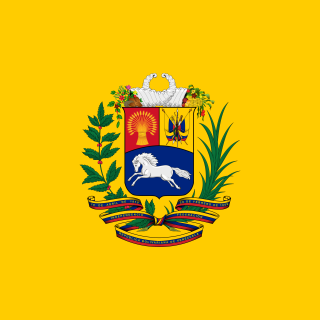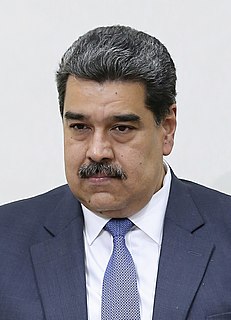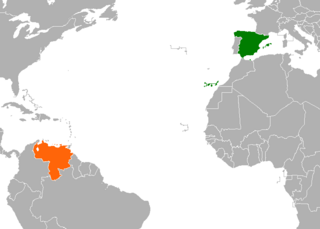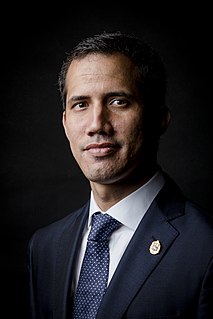
The president of Venezuela, officially known as the President of the Bolivarian Republic of Venezuela, is the head of state and head of government in Venezuela. The president leads the National Executive of the Venezuelan government and is the commander-in-chief of the National Bolivarian Armed Forces. Presidential terms were set at six years with the adoption of the 1999 Constitution of Venezuela, and presidential term limits were removed in 2009.

Nicolás Maduro Moros is a Venezuelan politician and president of Venezuela since 2013, with his presidency under dispute since 2019.

Juan José Rendón Delgado, known professionally as J. J. Rendón, is a Venezuelan political consultant, psychologist, and political activist.

Spain–Venezuelan relations are the bilateral relations between the Kingdom of Spain and the Bolivarian Republic of Venezuela. Both nations are members of the Association of Spanish Language Academies and the Organization of Ibero-American States.

Colectivos are far-left Venezuelan groups that support Nicolás Maduro, the Bolivarian government, the Great Patriotic Pole (GPP) political alliance and the ruling party, the United Socialist Party of Venezuela (PSUV). Colectivo has become an umbrella term for armed paramilitary groups that operate in poverty-stricken areas and attack individuals, engaging in "extortion, kidnapping, drug trafficking and murder". They commit extrajudicial killings and terrorize those who disagree with them with impunity.
Parliamentary elections were held in Venezuela on 6 December 2020. Aside from the 167 deputies of the National Assembly who are eligible to be re-elected, the new National Electoral Council president announced that the assembly would increase by 110 seats, for a total of 277 deputies to be elected.

Juan Gerardo Guaidó Márquez is a Venezuelan politician, a former member of the social-democratic Popular Will party, and federal deputy to the National Assembly representing the state of Vargas. On 23 January 2019, Guaidó and the National Assembly declared he was acting president of Venezuela, starting the Venezuelan presidential crisis by challenging Nicolás Maduro's presidency.

The Venezuelan presidential crisis is an ongoing political crisis concerning the leadership and the legitimate president of Venezuela; the office of the president has been contested since 10 January 2019, with the nation and the world divided in support for Nicolás Maduro or Juan Guaidó. The process and results of the 20 May 2018 presidential election were widely disputed. The opposition-majority National Assembly declared Maduro a "usurper" of the presidency on the day of his second inauguration and disclosed a plan to set forth its president Guaidó as the succeeding acting president of the country under article 233 of the Venezuelan Constitution. A week later, the Supreme Tribunal of Justice declared that the presidency of the National Assembly was the "usurper" of authority and declared the body to be unconstitutional.

The 2019 Venezuelan protests began in the first days of January as a result of the Venezuelan presidential crisis. Protests against the legitimacy of the Nicolás Maduro's presidency began at the time of his second inauguration following a controversial presidential election in 2018. Rallies of support were also held for President of the National Assembly, Juan Guaidó, with some Venezuelans and foreign government's recognizing him as the acting President of Venezuela.

The 2019 Venezuelan protests are a collection of protests that have been organized, since 11 January, as a coordinated effort to remove Nicolás Maduro from the presidency. Demonstrations began following Maduro's controversial second inauguration, developing into a presidential crisis between Maduro and National Assembly president Juan Guaidó. The protests also include counter-demonstrations organized by those who support Maduro.

During the ongoing Venezuelan presidential crisis concerning who is the legitimate President of Venezuela, reactions and responses to the crisis have been divided.
The Statute Governing the Transition to Democracy to Re-establish the Validity of the Constitution of the Bolivarian Republic of Venezuela is a statute adopted by the Venezuelan National Assembly that defines the "duration of a transition government and its political and economic responsibilities". Approved on 5 February 2019, through its seven chapters and thirty-nine articles, the Transition Statute "governs the installation of a provisional Government and the convocation of free elections", and "establishes the election of new rectors of the National Electoral Council, new magistrates of the Supreme Tribunal of Justice and new representatives of the Citizen Power." It also establishes that – in the absence of a constitutionally elected president – the National Assembly President is the Acting President of Venezuela.

Nationwide recurring electrical blackouts in Venezuela began in March 2019. Experts and state-run Corpoelec sources attribute the electricity shortages to lack of maintenance and to a lack of technical expertise in the country resulting from a brain drain; Nicolás Maduro's administration attributes them to sabotage. Since March, various nationwide blackouts occurred in the country.
There has been censorship and media control during Venezuelan presidential crisis between 2019 and 2020.
The negotiations during the crisis in Venezuela are the negotiation and dialogue attempts and processes between the government of Nicolás Maduro and the Venezuelan opposition.

Defections from the Bolivarian Revolution occurred under the administrations of Presidents Hugo Chávez and Nicolás Maduro. The 2019 Venezuelan presidential crisis concerning who is the legitimate President of Venezuela has been underway since 10 January 2019, when the opposition-majority National Assembly declared that incumbent Nicolás Maduro's 2018 reelection was invalid and the body declared its president, Juan Guaidó, to be acting president of the nation. Guaidó encouraged military personnel and security officials to withdraw support from Maduro, and offered an amnesty law, approved by the National Assembly, for military personnel and authorities who help to restore constitutional order.

On 30 April, during the Venezuelan presidential crisis, a group of several dozen military personnel and civilians joined Juan Guaidó in his call for an uprising against Nicolás Maduro as part of what he labeled "Operation Freedom". Reuters reported an "uneasy peace" by the afternoon of 30 April. During the uprising attempt, opposition leader Leopoldo López was freed from house arrest after being imprisoned for five years. The head of the Bolivarian Intelligence Service, Manuel Cristopher Figuera denounced the Maduro government and was dismissed from his position before going into hiding. At least 25 military men who opposed Maduro sought asylum at the Brazilian embassy in Caracas.

Presidential elections are scheduled to be held in Venezuela by 2024 to choose a president for a six-year term beginning on 10 January 2025.

Chile–Venezuela relations refers to the diplomatic relations between the Republic of Chile and the Bolivarian Republic of Venezuela. Both nations are members of the Community of Latin American and Caribbean States, Group of 77, Latin American Integration Association, Organization of American States, Organization of Ibero-American States and the United Nations.
The Unitary Platform is a Venezuelan opposition political alliance made up of civil society, trade unions, retired military personnel, political parties, and deputies of the 2016–2021 National Assembly.














